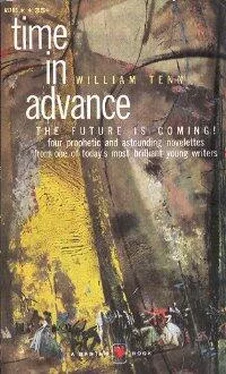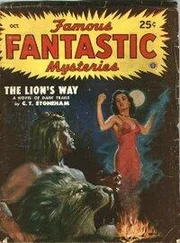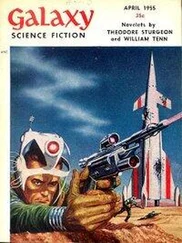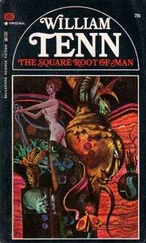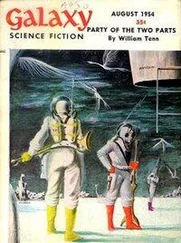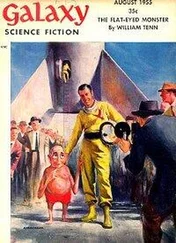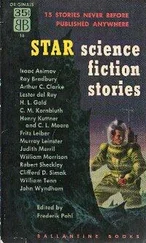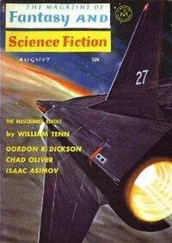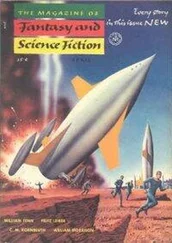William Tenn - The Sickness
Здесь есть возможность читать онлайн «William Tenn - The Sickness» весь текст электронной книги совершенно бесплатно (целиком полную версию без сокращений). В некоторых случаях можно слушать аудио, скачать через торрент в формате fb2 и присутствует краткое содержание. Год выпуска: 1955, Издательство: Royal Publications, Жанр: Фантастика и фэнтези, на английском языке. Описание произведения, (предисловие) а так же отзывы посетителей доступны на портале библиотеки ЛибКат.
- Название:The Sickness
- Автор:
- Издательство:Royal Publications
- Жанр:
- Год:1955
- ISBN:нет данных
- Рейтинг книги:5 / 5. Голосов: 1
-
Избранное:Добавить в избранное
- Отзывы:
-
Ваша оценка:
- 100
- 1
- 2
- 3
- 4
- 5
The Sickness: краткое содержание, описание и аннотация
Предлагаем к чтению аннотацию, описание, краткое содержание или предисловие (зависит от того, что написал сам автор книги «The Sickness»). Если вы не нашли необходимую информацию о книге — напишите в комментариях, мы постараемся отыскать её.
magazine in 1955.
The Sickness — читать онлайн бесплатно полную книгу (весь текст) целиком
Ниже представлен текст книги, разбитый по страницам. Система сохранения места последней прочитанной страницы, позволяет с удобством читать онлайн бесплатно книгу «The Sickness», без необходимости каждый раз заново искать на чём Вы остановились. Поставьте закладку, и сможете в любой момент перейти на страницу, на которой закончили чтение.
Интервал:
Закладка:
The Sickness
by William Tenn
For the record, it was a Russian, Nicolai Belov, who found it and brought it back to the ship. He found it in the course of a routine geological survey he was making some six miles from the ship the day after they landed. For what it might be worth, he was driving a caterpillar jeep at the time, a caterpillar jeep that had been made in Detroit, U.S.A.
He radioed the ship almost immediately. Preston O’Brien, the navigator, was in the control room at the time, as usual, checking his electronic computers against a dummy return course he had set up. He took the call. Belov, of course, spoke in English; O’Brien in Russian.
“O’Brien,” Belov said excitedly, once identification had been established. “Guess what I’ve found? Martians! A whole city!”
O’Brien snapped the computer relays shut, leaned back in the bucket seat, and ran his fingers through his crewcut red hair. They’d had no right to, of course but somehow they’d all taken it for granted that they were alone on the chilly, dusty, waterless planet. Finding it wasn’t so gave him a sudden acute attack of claustrophobia. It was like looking up from his thesis work in an airy, silent college library to find it had filled with talkative freshmen just released from a class in English composition. Or that disagreeable moment at the beginning of the expedition, back in Benares, when he’d come out of a nightmare in which he’d been drifting helplessly by himself in a starless black vacuum to find Kolevitch’s powerful right arm hanging down from the bunk above him and the air filled with sounds of thick Slavic snores. It wasn’t just that he was jumpy, he’d assured himself; after all, everyone was jumpy . . . these days.
He’d never liked being crowded. Or being taken by surprise. He rubbed his hands together irritably over the equations he’d scribbled a moment before. Of course, come to think of it, if anyone was being crowded, it was the Martians. There was that.
O’Brien cleared his throat and asked:
“Live Martians?”
“No, of course not. How could you have live Martians in the cupful of atmosphere this planet has left? The only things alive in the place are the usual lichens and maybe a desert flatworm or two, the same as those we found near the ship. The last of the Martians must have died at least a million years ago. But the city’s intact, O’Brien, intact and almost untouched!”
For all his ignorance of geology, the navigator was incredulous. “Intact? You mean it hasn’t been weathered down to sand in a million years?”
“Not a bit,” Belov chortled. “You see it’s underground. I saw this big sloping hole and couldn’t figure it: it didn’t go with the terrain. Also there was a steady breeze blowing out of the hole, keeping the sand from piling up inside. So I nosed the jeep in, rode downhill for about fifty, sixty yards—and there it was, a spacious, empty Martian city, looking like Moscow a thousand, ten thousand years from now. It’s beautiful, O’Brien, beautiful!”
“Don’t touch anything,” O’Brien warned. Moscow! Like Moscow yet!
“You think I’m crazy? I’m just taking a couple of shots with my Rollei. Whatever machinery is operating that blower system is keeping the lights on; it’s almost as bright as daylight down here. But what a place! Boulevards like colored spider webs. Houses like—like— Talk about the Valley of the Kings, talk about Harappa! They’re nothing, nothing at all to this find. You didn’t know I was an amateur archaeologist, did you, O’Brien? Well, I am. And let me tell you, Schliemann would have given his eyes—his eyes!—for this discovery! It’s magnificent!”
O’Brien grinned at his enthusiasm. At moments like this you couldn’t help feeling that the Russkys were all right, that it would all work out—somehow. “Congratulations,” he said. “Take your pictures and get back fast. I’ll tell Captain Ghose.”
“But listen, O’Brien, that’s not all. These people—these Martians—they were like us! They were human!”
“Human? Did you say human? Like us?”
Belay’s delighted laugh irradiated the earphones. “That’s exactly the way I felt. Amazing, isn’t it? They were human, like us. If anything, even more so. There’s a pair of nude statues in the middle of a square that the entrance opens into. Phidias or Praxiteles or Michelangelo wouldn’t have been ashamed of those statues, let me tell you. And they were made back in the Pleistocene or Pliocene, when sabertooth tigers were still prowling the Earth!”
O’Brien grunted and switched off. He strolled to the control room porthole, one of the two that the ship boasted, and stared out at the red desert that humped and hillocked itself endlessly, repetitiously, until, at the furthest extremes of vision, it disappeared in a sifting, sandy mist.
This was Mars. A dead planet. Dead, that is, except for the most primitive forms of vegetable and animal life, forms which could survive on the minute rations of water and air that their bitterly hostile world allotted them. But once there had been men here, men like himself, and Nicolai Belov. They had had art and science as well as, no doubt, differing philosophies. They had been here once, these men of Mars, and were here no longer. Had they too been set a problem in coexistence—and had they failed to solve it?
Two space-suited figures clumped into sight from under the ship. O’Brien recognized them through their helmet bubbles. The shorter man was Fyodor Guranin, Chief Engineer; the other was Tom Smathers, his First Assistant. They had evidently been going over the rear jets, examining them carefully for any damage incurred on the outward journey. In eight days, the first Terrestrial Expedition to Mars would start home: every bit of equipment had to be functioning at optimum long before that.
Smathers saw O’Brien through the porthole and waved. The navigator waved back. Guranin glanced upwards curiously, hesitated a moment, then waved too. Now O’Brien hesitated. Hell, this was silly. Why not? He waved at Guranin, a long, friendly, rotund wave.
Then he smiled to himself. Chose should only see them now! The tall captain would be grinning like a lunatic out of his aristocratic, coffee-colored face. Poor guy! He was living on emotional crumbs like these.
And that reminded him. He left the control room and looked in at the galley where Semyon Kolevitch, the Assistant Navigator and Chief Cook, was opening cans in preparation for their lunch. “Any idea where the captain is?” he inquired in Russian.
The man glanced at him coolly, finished the can he was working on, tossed the round flat top into the wall disposer-hole, and then replied with a succinct English “No”.
Out in the corridor again, he met Dr. Alvin Schneider on the way to the galley to work out his turn at K.P. “Have you seen Captain Chose, Doc?”
“He’s down in the engine room, waiting to have a conference with Guranin,” the chubby little ship’s doctor told him. Both men spoke in Russian.
O’Brien nodded and kept going. A few minutes later, he pushed open the engineroom door and came upon Captain Sabodh Chose, late of Benares Polytechnic Institute, Benares, India, examining a large wall chart of the ship’s jet system. Despite his youth—like every other man on the ship, Chose was under twenty-five—the fantastic responsibilities he was carrying had ground two black holes into the flesh under the captain’s eyes. They made him look perpetually strained. Which he was, O’Brien reflected, and no two ways about it.
He gave the captain Belov’s message.
“Hm,” Ghose said, frowning. “I hope he has enough sense not to—” He broke off sharply as he realized he had spoken in English. “I’m terribly sorry, O’Brien!” he said in Russian, his eyes looking darker than ever. “I’ve been standing here thinking about Guranin; I must have thought I was talking to him. Excuse me.”
Читать дальшеИнтервал:
Закладка:
Похожие книги на «The Sickness»
Представляем Вашему вниманию похожие книги на «The Sickness» списком для выбора. Мы отобрали схожую по названию и смыслу литературу в надежде предоставить читателям больше вариантов отыскать новые, интересные, ещё непрочитанные произведения.
Обсуждение, отзывы о книге «The Sickness» и просто собственные мнения читателей. Оставьте ваши комментарии, напишите, что Вы думаете о произведении, его смысле или главных героях. Укажите что конкретно понравилось, а что нет, и почему Вы так считаете.
